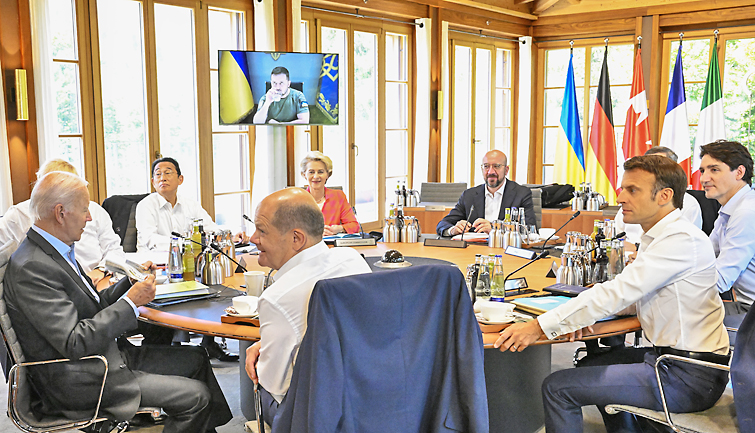ELMAU, GERMANY (AP) – The Group of Seven (G7) economic powers are set to commit themselves to supporting Ukraine for the long haul, with the United States (US) preparing to announce the purchase of an advanced surface-to-air missile system for Kyiv.
Leaders are also set to announce an agreement to pursue a price cap on Russian oil, raise tariffs on Russian goods and impose new sanctions on hundreds of officials and entities supporting the four-month long war.
Leaders were finalising the deal to seek a price cap during their three-day summit in the German Alps, where they conferred by video link with Ukrainian President Volodymyr Zelenskyy.
The details of how a price cap would work, as well as its impact on the Russian economy, were to be resolved by the G7 finance ministers in the coming weeks and months, according to a senior administration official who spoke on the condition of anonymity to preview the announcements from the G7 leaders’ summit.
The largest democratic economies will also commit to raising tariffs on Russian imports to their countries, with the US announcing new tariffs on 570 categories of goods, as well as use of sanctions to target Russia’s defence supply chains that support its effort to rearm during the war.
US President Joe Biden is set to announce that the US is providing an advanced surface-to-air missile system to Ukraine, as well as additional artillery support, according to a person familiar with the matter, in the latest assistance meant to help the country defend against Russia’s bloody invasion.

The US is purchasing NASAMS, a Norwegian-developed anti-aircraft system, to provide medium- to long-range defence, according to the person, who spoke on the condition of anonymity. NASAMS is the same system used by the US to protect the sensitive airspace around the White House and US Capitol in Washington.
Additional aid includes more ammunition for Ukrainian artillery, as well as counter-battery radars, to support its efforts against the Russian assault in the Donbas, the person said.
Biden is also announcing a USD7.5 billion commitment to help Ukraine’s government meet its expenses, as part of a drawdown of the USD40 billion military and economic aid package he signed into law last month.
The G7 leaders began yesterday’s session of their three-day summit with a focus on Ukraine.
Later, they will be joined by the leaders of five democratic emerging economies – India, Indonesia, South Africa, Senegal and Argentina – for a discussion on climate change, energy and other issues.
The war in Ukraine was already at the forefront of the G7 leaders’ minds as they opened their summit at the secluded Schloss Elmau luxury hotel on Sunday – just as Russian missiles hit the Ukrainian capital of Kyiv for the first time in weeks.
Biden said on Sunday that Russian President Vladimir Putin “has been counting on, from the beginning, that somehow NATO and the G7 would splinter, but we haven’t and we’re not going to”. Britain’s Boris Johnson warned the leaders not to give in to “fatigue”.
Biden hopes to use his trip to Europe to proclaim the unity of the coalition pressing to punish Russia for its invasion of Ukraine as much as he is urging allies to do even more – seeking to counter doubts about its endurance as the war grinds into its fifth month.
The summit’s host German Chancellor Olaf Scholz said last week that he wants to discuss the outlines of a “Marshall plan for Ukraine” with his counterparts, referring to the plan that helped revive European economies after World War II. With the war still in progress and destruction mounting by the day, it’s unlikely to be a detailed plan at this stage. Scholz has said that “rebuilding Ukraine will be a task for generations”.
The G7 already is committed to help finance Ukraine’s immediate needs.
Finance ministers from the group last month agreed to provide USD19.8 billion in economic aid to help Kyiv keep basic services functioning and prevent tight finances from hindering its defence against Russian forces.






